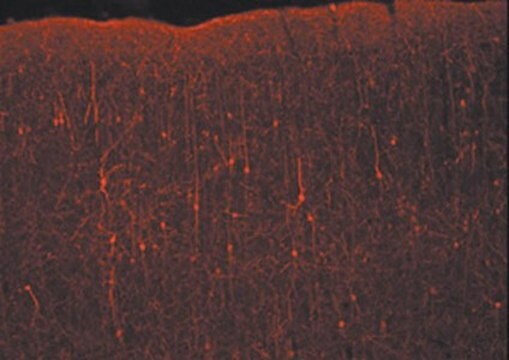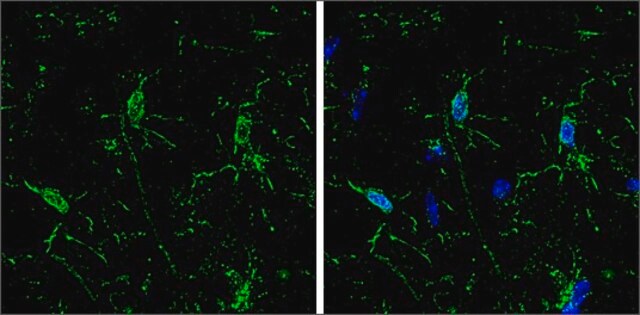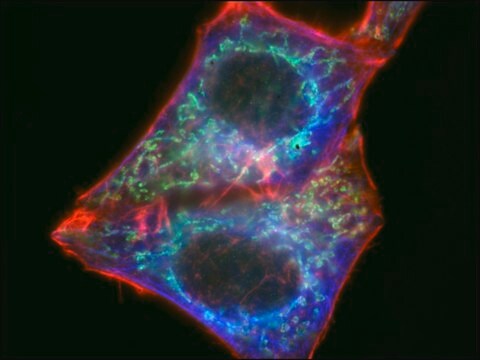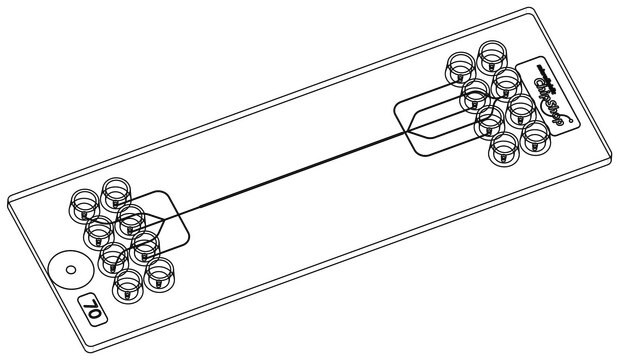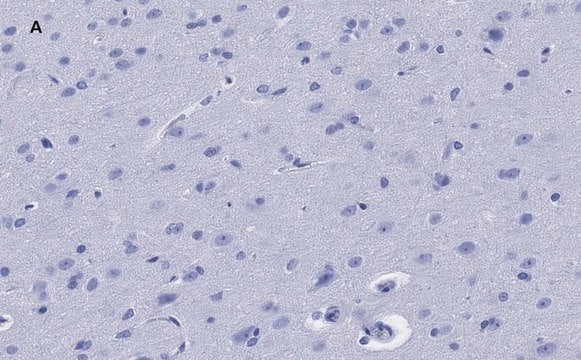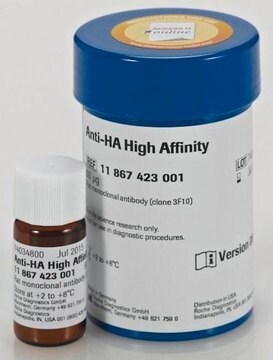AP192F
Donkey Anti-Mouse IgG Antibody, FITC conjugate, Species Adsorbed
Chemicon®, from donkey
Zaloguj sięWyświetlanie cen organizacyjnych i kontraktowych
About This Item
Kod UNSPSC:
12352203
eCl@ss:
32160702
NACRES:
NA.46
Polecane produkty
pochodzenie biologiczne
donkey
Poziom jakości
białko sprzężone
FITC conjugate
forma przeciwciała
affinity purified immunoglobulin
rodzaj przeciwciała
secondary antibodies
klon
polyclonal
reaktywność gatunkowa
mouse
producent / nazwa handlowa
Chemicon®
metody
immunofluorescence: suitable
Warunki transportu
wet ice
docelowa modyfikacja potranslacyjna
unmodified
Opis ogólny
Immunoglobulin G (IgG), is one of the most abundant proteins in human serum with normal levels between 8-17 mg/mL in adult blood. IgG is important for our defence against microorganisms and the molecules are produced by B lymphocytes as a part of our adaptive immune response. The IgG molecule has two separate functions; to bind to the pathogen that elicited the response and to recruit other cells and molecules to destroy the antigen. The variability of the IgG pool is generated by somatic recombination and the number of specificities in an individual at a given time point is estimated to be 1011 variants.
Specyficzność
Specific for Mouse IgG.
Zastosowanie
Detect Donkey Mouse IgG using this Donkey anti-Mouse IgG Antibody, FITC conjugate, Species Adsorbed validated for use in IF.
Research Category
Secondary & Control Antibodies
Secondary & Control Antibodies
Research Sub Category
Secondary Antibodies Adsorbed for Dual Labeling
Secondary Antibodies Adsorbed for Dual Labeling
Suggested dilution for most applications: 1:50-1:200.
Optimal working dilutions must be determined by the end user.
Optimal working dilutions must be determined by the end user.
Postać fizyczna
ImmunoAffinity Purified
Lyophilized. Buffer = 0.02 M Sodium Phosphate, 0.25 M NaCl, pH 7.6, with 15 mg/mL BSA and 0.1% sodium azide.
RECONSTITUTION:
Reconstitute to 1 mg/mL with sterile distilled water.
F/P RATIO:
15 micrograms FITC per mg of antibody.
RECONSTITUTION:
Reconstitute to 1 mg/mL with sterile distilled water.
F/P RATIO:
15 micrograms FITC per mg of antibody.
Przechowywanie i stabilność
Maintain lyophilized product at 2–8°C for up to 12 months. After reconstitution the product is stable for several weeks at 2–8°C as an undiluted liquid. For extended storage after reconstitution, add an equal volume of glycerol to make a final concentration of 50% glycerol followed by storage at -20°C in undiluted aliquots for up to 12 months. Please note the concentration of protein (and buffer salts) will decrease to one-half of the original after the addition of glycerol. Avoid repeated freeze/thaw cycles.
Informacje prawne
CHEMICON is a registered trademark of Merck KGaA, Darmstadt, Germany
Oświadczenie o zrzeczeniu się odpowiedzialności
Unless otherwise stated in our catalog or other company documentation accompanying the product(s), our products are intended for research use only and are not to be used for any other purpose, which includes but is not limited to, unauthorized commercial uses, in vitro diagnostic uses, ex vivo or in vivo therapeutic uses or any type of consumption or application to humans or animals.
Ta strona może zawierać tekst przetłumaczony maszynowo.
Nie możesz znaleźć właściwego produktu?
Wypróbuj nasz Narzędzie selektora produktów.
Zwroty wskazujące rodzaj zagrożenia
Zwroty wskazujące środki ostrożności
Klasyfikacja zagrożeń
Aquatic Chronic 3
Kod klasy składowania
11 - Combustible Solids
Klasa zagrożenia wodnego (WGK)
WGK 3
Certyfikaty analizy (CoA)
Poszukaj Certyfikaty analizy (CoA), wpisując numer partii/serii produktów. Numery serii i partii można znaleźć na etykiecie produktu po słowach „seria” lub „partia”.
Masz już ten produkt?
Dokumenty związane z niedawno zakupionymi produktami zostały zamieszczone w Bibliotece dokumentów.
The use of dentin matrix scaffold and dental follicle cells for dentin regeneration.
Weihua Guo,Yong He,Xiaojun Zhang,Wei Lu,Chunmei Wang,Hua Yu,Yuan Liu,Yuan Li,Yalei Zhou et al.
Biomaterials null
Ryosuke Saigusa et al.
Proceedings of the National Academy of Sciences of the United States of America, 112(49), 15136-15141 (2015-11-26)
Systemic sclerosis (SSc) is a multisystem autoimmune disorder with clinical manifestations resulting from tissue fibrosis and extensive vasculopathy. A potential disease susceptibility gene for SSc is IFN regulatory factor 5 (IRF5), whose SNP is associated with milder clinical manifestations; however
Odontogenic potential of mesenchymal cells from hair follicle dermal papilla.
Gang Wu, Zhi-Hong Deng, Xiao-Ju Fan, Zhao-Feng Ma, Ya-Juan Sun, Dan-Dan Ma, Jun-Jie Wu et al.
Stem Cells and Development null
Tooth root regeneration using dental follicle cell sheets in combination with a dentin matrix - based scaffold.
Bo Yang,Gang Chen,Jie Li,Qing Zou,Dan Xie,Yali Chen,Hang Wang,Xiaohui Zheng,Jie Long et al.
Biomaterials null
Weihua Guo et al.
Cell transplantation, 23(2), 181-194 (2013-02-01)
Cell transplantation has emerged as a novel therapeutic strategy for periodontitis, and the adoption of cell pellet offers advantages by secreting abundant extracellular matrix (ECM) and eliminating the adverse effect of cell carriers. This study aimed to fabricate scaffold-free periodontal
Nasz zespół naukowców ma doświadczenie we wszystkich obszarach badań, w tym w naukach przyrodniczych, materiałoznawstwie, syntezie chemicznej, chromatografii, analityce i wielu innych dziedzinach.
Skontaktuj się z zespołem ds. pomocy technicznej